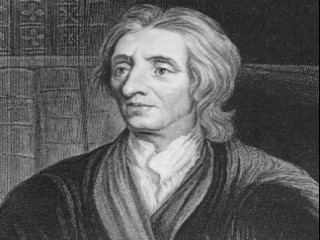
John Locke biography
Date of birth : 1632-08-29
Date of death : 1704-10-28
Birthplace : Wrington, England
Nationality : British
Category : Famous Figures
Last modified : 2010-10-04
Credited as : Philosopher, author,
5 votes so far
John Locke was born on August 29, 1632, in Wrington, in Somerset, where his mother's family resided. She died during his infancy, and Locke was raised by his father, a small-town attorney. John was tutored at home because of his delicate health. He then went to Christ Church, Oxford, where in 1658 he was elected senior student and taught Greek and moral philosophy. He changed his subject to medicine and received a license to practice. Here Locke met Robert Boyle, the distinguished scientist and one of the founders of the Royal Society, and, under Boyle's direction, took up study of natural science. Finally, in 1668, Locke was made a fellow of the Royal Society.
Locke met Lord Ashley, first Earl of Shaftesbury, and later lord chancellor of England, and their lifelong association drew Locke into political affairs. He attended Shaftesbury as physician and adviser, and in this latter capacity Locke drafted The Fundamental Constitutions of Carolina and served as secretary to the Board of Trade. Locke wrote most of his important writings in Holland where he lived with the exiled Shaftsbury. Locke died in Essex on October 28, 1704.
None of Locke's major writings were published until he was nearly sixty. In 1690 he brought out his major works: Two Treatises and the Essay Concerning Human Understanding. But the four books of the Essay were the culmination of twenty years of intellectual labor.
The intention of Locke's Essay was positive in that Locke wished to establish the dependence of all human knowledge upon everyday experience or sensation. The alternative theory of innate ideas he vigorously attacked. Although it is not historically certain whether anyone seriously maintained such a doctrine, Locke's general criticism lends indirect support to an experiential view of knowledge. Innatism can be understood in a naive way to mean that there are ideas of which we are fully conscious at birth or which are universally acknowledged, so that the mind possesses a disposition to think in terms of certain ideas. The first position is refuted by observation of children, and the second by the fact that there are no acknowledged universal ideas to which everyone agrees. The sophisticated version falls into contradiction by maintaining that we are conscious of an unconscious disposition.
Having refuted the a priori, or nonexperiential, account of knowledge, Locke devoted the first two books of the Essay to developing a deceptively simple empirical theory of knowledge. Knowing originates in external and internal sources of sensation and reflection. The objects or ideas present to consciousness are divided into simple and complex. Simple ideas are primitive sense data, which the mind passively receives and cannot alter, delivered by one sense (seeing blue), by several senses (eating an orange as a synthesis of taste, touch, and smell), by reflection (hunger), or by a combination of sensation and reflection (pleasure and pain). The objective orientation of simple ideas follows from the fact that we cannot add or subtract from their appearance or conception in the mind. In relation to simple ideas, at least, the mind is passive, a "blank" or "white" tablet upon which sensations are impressed. Complex ideas are formed by actively combining, comparing, or abstracting simple ideas to yield "modes, substances, and relations." Modes are class concepts or ideas that do not exist independently, such as beauty.
Locke was faced with an acute dilemma. If the immediate object of knowledge is an idea, then man possesses only a derivative knowledge of the physical world. To know the real world adequately requires a complex idea which expresses the relation between the qualities that we perceive subjectively and the unperceived existent. The substance which unites the common perceived qualities of figure, bulk, and color into this one existing brown table is, in Locke's terms, an "I don't know what." His honesty almost brought Locke to a modern relational definition of substance instead of the traditional notion of a thing characterized by its properties. But the conclusion drawn in the Essay is that knowledge is relational; that is, it consists in the perception "of the agreement or disagreement among ideas."
The third book of the Essay deals with words, and it is a pioneer contribution to the philosophy of language. Locke is a consistent nominalist in that for him language is an arbitrary convention and words are things which "stand for nothing but the ideas in the mind of the man that has them." Each man's understanding can be confirmed by other minds insofar as they share the same linguistic conventions, although one of the singular abuses of language results from the fact that we learn names or words before understanding their use. The purpose of Locke's analysis is to account for generalization, abstraction, and universals in terms of language. The final section of the Essay deals with the extent, types, and divisions of knowledge. This work seems to have been written earlier than the others, and many of its conclusions are qualified by preceding material.
In this view the actual extent of man's knowledge is less than his ideas because he does not know the real connections between simple ideas, or primary and secondary qualities. Also, an intuitive knowledge of existence is limited to the self, and the only demonstrable existence is that of God as an eternal, omnipotent being. With the exception of the self and God, all knowledge of existing things is dependent upon sensation, whose cognitive status is "a little bit better than probability." The poverty of real knowledge is compensated to some extent by human judgment, which presumes things to be true without actually perceiving the connections. And, according to Locke's commonsense attitude, the severe restrictions placed upon knowledge merely reflect that man's mental capacity is suitable for his nature and condition.
















